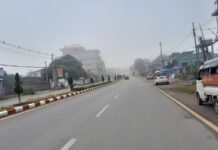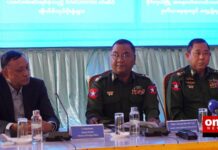Just before the year end, a row erupted between the Shan alliance, Committee for Unity of Shan State (CSSU) and the Tatmadaw (Military) and government due to the latter’s disruption, blockage and prohibition of the pre-Political Dialogue (PD) or public consultation of the Shan people, which has been approved by the Joint Implementation Coordination Meeting (JICM) and Union Peace Dialogue Joint Committee (UPDJC), which the Tatmadaw and government are also members.
JICM is the highest organ that steers the Nationwide Ceasefire Agreement (NCA)-based peace negotiation process. It is made up of two groups with 8 members each. One is the government, parliament and military combined and the other the signatory Ethnic Armed Organizations (EAOs).
On top of this, the Restoration Council of Shan State/Shan State Army (RCSS/SSA), that is one of the strongest group within the signatories, had also signed the state and union-levels ceasefire agreement, prior to the inking of the 15 October 2015 NCA, during the era of President Thein Sein.
In the union-level ceasefire agreement between the RCSS and the government negotiated and signed in Kengtung on May 19, 2012, part of the clause said: “The RCSS/SSA is free to hold political consultations with individuals, groups and communities throughout the country.”
 Tatmadaw disruption of Shan public consultations
Tatmadaw disruption of Shan public consultations
The Shan national preparatory meeting to plan the public consultations covering 45 townships in Shan State and towns outside Shan State, where Shan national have settlements, kicked off in early December in Taunggyi, under the guidance of CSSU. It produced guidelines on what to convey to the people across the Townships and gather consensus, that in turn are to be presented to the Taunggyi summarized facts gathering planned meeting on 7 to 9 January 2018, after which the gathered consensus would be tabled at the Larng Khur PD conference to be held also in January.
Gen Yawd Serk, leader of the RCSS told Shan Herald Agency for News (SHAN) on December 25 that if the Tatmadaw again prohibited the Taunggyi meeting, the Shan PD in Larng Khur will not happen and consequently, it will not be able to attend the forthcoming Union Peace Conference – 21st Century Panglong (UPC – 21CP) also. He stressed this will have a negative impact on the peace process as a whole, which won’t benefit any party.
The Tatmadaw had prohibited the Shan consultation meetings in Panglong twice, Tachilek, Lashio, Kyaukme, Mandalay and other various places. According to the Shan sources at least four Townships meetings were canceled, as the Shan State government retracted its prior endorsement of the consultation meetings, which had asked all government’s organs to help support the undertakings. The retraction of Shan State government came about when the Tatmadaw openly prohibited the Shan public consultation meetings, sending armed troops to prove its point that it is serious to disrupt and stop the Shan’s public consultation meetings.
Not long after rejection of the Tatmadaw of Shan consultation meetings, the government’s National Reconciliation and Peace Center (NRPC) general secretary Khin Zaw Oo came up with a clarification reported by 7 Day Daily, saying: “The meeting for Shan national is allowed to take place in Larng Khur (Lin Khae in Burmese), but there is no official allowance to hold pre-consultation meetings. As they are holding such meetings, the government has to prohibit them.”
He further pointed out that the Karen National Union (KNU), also a signatory EAO, has only done its national-level PD in Hpa-An and pre-consultation once at its headquarters in Law Khee Lah.
Is the motive Shan secession issue?
Shan sources said that the Tatmadaw’s and the National League for Democracy (NLD)-led regime’s phobia in trying to block the Shan’s public consultation meetings might be anchored in the controversial secession issue, which the Tatmadaw pushed to secure during the second 21st Century Panglong Conference from 24 to 29 May, 2017, in which the Shans, together with other ethnic groups, were bitterly against the inclusion of “non-secession” clause in the Union Accord and thus had to drop it for further deliberation.
The Shan and as well many of the ethnic nationalities position was, in return for the inclusion of non-secession clause, the Bamar side – meaning the Tatmadaw and the NLD – must also agree to an extra agreement that so long as the Panglong Agreement of 1947 is upheld and adhered, in words, deeds and spirit, the ethnic nationalities won’t secede.
The Bamar side was said to have rejected the counter proposal.
Peaceful co-habitation or parting of ways
Thus, in short, the Bamar disruption of the Shan consultation meeting is the result of angst and phobia that the Shan population will opt for secession consensus, given the Tatmadaw’s decades-long oppression and human rights violations, creating distrust and hatred among the Shan population on its oppressors, and thus is keen to block it from happening.
But the logic is that blockage alone will not keep the forced union through military might, as is now the case, together in tact all the time. Understanding and mutual trust instead of a forced union through oppression and military might be able to find solution and political settlement, where voluntary union, as in 1947-48 after the British colonial rule ended, could be formed and harmony restored, if there is a political will on the part of Burmese or Bamar center.
Now the mood of the Shan people, in the aftermath of the row on blockage of Shan consultation meetings, is that the union-level Kengtung ceasefire agreement between the RCSS and the government might have been gone – meaning disregarded – together with U Aung Min, the then chief peace negotiator of the President Thein Sein’s government.
And as a result, some are already paraphrasing Sai Kham Leik’s song “Lik Hom Maai Paang Long” (Panglong Agreement), where the song bemoans “Whether the promises of Panglong Agreement of 1947 that later was interpreted in the Union of Burma Constitution, which said the Shan could secede if they were not satisfied with the union after 10 years of trail period, has gone together with the death of Gen Aung San, who represented the Bamar interim government before the British finally left Burma.”
It is high time now that all the stakeholders, especially the ethnic nationalities and the Bamar center, to reassess their political positions and decide if all still want to find an acceptable solution to make co-habitation possible or find a civilized divorce and becomes good neighbors. Of course, the alternative way out could also be the prolonged civil war, with no one giving in, where no party wins and would definitely only lead to a lose-lose outcome, if seven decades of armed conflict that have plagued the country and forced endurance of human rights violations, poverty and underdevelopment would mean anything to the people.











Leave a Comments